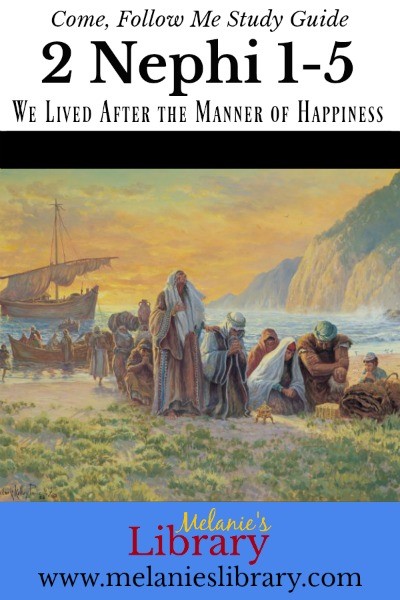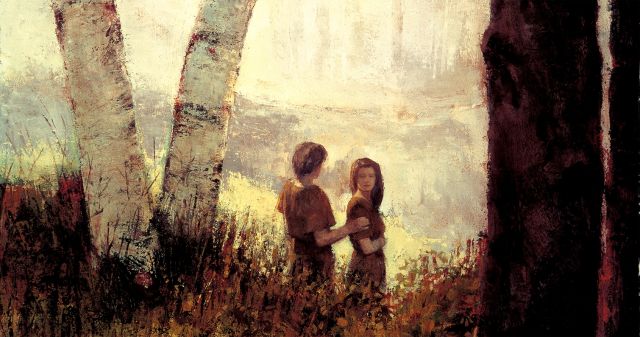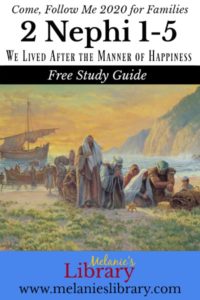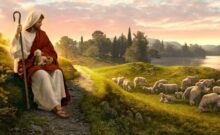Come, Follow Me Daily Study Guide for the week of February 3-9, 2020 covering 2 Nephi 1-5. For personal and/or family study of the scriptures, geared towards 8 years old and older.

*This is a suggested outline that coincides with the Come, Follow Me manual. There is not just one right way when it comes to studying the scriptures. Everyone should study in a way that is best for them, but I do hope that you find these outlines helpful.
*I highly suggest getting a scripture journal. Throughout the year there will be several times that I will suggest jotting something down in your scripture journal. These are also great for writing down any impressions or “Aha” moments that you might have as you study the scriptures.
==>>NEW<<==
***A free PDF DOWNLOAD of the Study Guide is available at the bottom of this post. Making it easy for those who’d like to print out a copy.
==>>NEW<<==
***SONGS – For a list of suggested songs for each day of the week, be sure and check out the new blog called Music for Latter-day Life by clicking HERE

FHE DAY
Start the week off right with a Family Home Evening that introduces what you’ll be studying during the week. Sign up for the Teach Me FHE email group and receive an FHE outline delivered right to your inbox every Sunday morning. Sign up at the bottom of this post.

I CAN TURN TO GOD IN MY WEAKNESS
BACKGROUND
Nephi had recently lost his father. The responsibility for leading his family now rested on him. He felt surrounded by temptation and was discouraged because of his sins. (CFM, pg 23)
Let’s put ourselves in Nephi’s shoes. Think of all the responsibilities that Nephi now has. Nephi is a father, a husband, maybe a grandfather, and now with Lehi gone he has also become the Church leader, the prophet.
Nephi depended a lot on his father for instruction, help, and guidance. He listened to what Lehi taught and followed Lehi’s counsel. So here he is, mourning the loss of his father and realizing the new heavy responsibility that he now has, plus he is being persecuted again by his brothers. You could say that Nephi was experiencing a pretty rough time in his life.
SCRIPTURE
2 Nephi 4:15-35 is often referred to as the Psalm of Nephi. As we all know, a psalm is like a song or a hymn. In these verses Nephi expresses the deep feelings of his soul.
READ: 2 Nephi 4: 15-35 *As you read, watch Nephi move from potential overwhelming discouragement to solid and firm confidence in his future with God.
MINI LESSON/PONDER & DISCUSS
Even if your circumstances are different from Nephi’s, what are some of his thoughts and emotions that you can relate to?
What helped Nephi in his afflictions?
How can Nephi’s response to his challenges help you face your struggles?
You may share one or more of the following insights…
VERSE 16: My heart pondereth continually upon the things which I have seen and heard. Do you take time to ponder and reflect on the things that you learn as you read the scriptures and receive answers to your prayers?
“It is one thing to have a revelation and quite another to understand it. The Pharaoh of Egypt dreamed a dream but could not interpret it (Genesis 41:1-32). Belshazzar saw the hand of the Lord write a message upon a wall but could not translate it (Daniel 5:1-31). The world is full of people who have the Bible but understand little if any of its heaven-sent message. Nephi saw a marvelous vision in his youth (1 Nephi 11-14) and spent a lifetime growing in his understanding of it.” (Doctrinal Commentary on the Book of Mormon, by Joseph Fielding McConkie and Robert L. Millet, pg 216)
VERSE 17: O wretched man that I am! What words would you use to describe Nephi? Would you call him a wretched man? Why would Nephi say he was a wretched man?
“Nephi’s references to personal sins should not be taken to imply any serious moral transgression on his part. No man could have seen and known God as he did who was not pure in heart. Rather, he is almost surely alluding to the negative emotions of anger, impatience, and frustration he must have felt at times in dealing with his enemies, his own family, and others who lacked his singleness of purpose…” (Rodney Turner from BYU Religious Studies)
VERSE 19: I know in whom I have trusted. How has the Lord taught you to trust?
Emily Belle Freeman shares a time when they had a struggling teenager in their home named Garett. She said, “One weekend night he wanted to go out with friends. I was a little bit worried about the people and the situation. I just didn’t feel good about it. So I asked if he could choose to do something else. ‘Why don’t you trust me?’ was his immediate response. The spirit prompted my reply, ‘Why don’t you trust me? Have I ever done anything that wasn’t for your good?’ His defiant eyes softened as he thought about the question, and then he shook his head. Like Garett, I have questioned the Lord. I have wondered if He has forgotten me. I have felt the doubt that comes when a prayer goes unanswered time after time. I wonder how often the Lord wants to whisper the same question to me: Why don’t you trust Me? Have I ever done anything that wasn’t for your good?” (Don’t Miss This, 2 Nephi 4:19)
VERSE 34: I will not put my trust in the arm of flesh. Or in other words, I will not place my trust in man. Has there ever been a time that you were misguided because you trusted in man rather than God?
“Ah, the arrogant arm of flesh, like the quarterback whose arm was so strong it was boasted that he could throw a football through a car wash and it would come out dry on the other side! Such naivete, such triviality symbolize not only the arm, but also the mind of flesh, which misses ‘things as they really are, and…things as they really will be’ (Jacob 4:13).” (Neal a. Maxwell, Ensign, May 1997, pg 16)
OPTIONAL – End with video of BYU Men’s Choruses sing “I Love the Lord,” (5:00) an adaptation of Nephi’s psalm from 2 Nephi 4. Click HERE
ADDITIONAL RESOURCES (optional)
CONFERENCE TALK: Susan W. Tanner, “My Soul Delighteth in the Things of the Lord,” Gen Conf, Apr 2008
CONFERENCE TALK: D. Todd Christofferson, “That They May Be One in Us,” Gen Conf, Oct 2002
VIDEO: Is Nephi’s Psalm Really a Psalm? (Knowhy #30) (1:06)
ENSIGN ARTICLE: He Can Turn Weakness to Strength By Elder Randall K. Bennett

HAPPINESS IS FOUND IN CHOOSING TO LIVE THE GOSPEL
BACKGROUND/SCRIPTURE
WATCH: How to Trap a Monkey video, click HERE
Just as the monkey chose not to let go of the fruit that was in the calabash and therefore was captured, we too must choose whether to let go of sin and be happy or to hang on to sin and be captured by the adversary. Laman and Lemuel, unfortunately, chose not to let go of their sins. They continually chose to turn away from God and to be angry towards members of their family.
Our freedom to choose is part of The Plan of Happiness. If we were not able to choose for ourselves, then that would be Satan’s plan.
QUOTE BY ELDER D. TODD CHRISTOFFERSON:
“God intends that His children should act according to the moral agency He has given them…It is His plan and His will that we have the principal decision-making role in our own life’s drama” (“Free Forever, to Act for Themselves,” Ensign or Liahona, Nov. 2014, 16)
In 2 Nephi chapter 2, Lehi teaches that there must be opposition in all things so that we may choose for ourselves happiness or misery.
READ: 2 Nephi 2:11-16
In life, we are given a lot of choices. The question we are faced with on a daily basis is, “How will I choose?” Each choice that we make either leads us down the straight and narrow path or down a path leading away from God.
MINI LESSON
In 2 Nephi chapter 5 Laman and Lemuel’s choices lead them to be cut off from the presence of the Lord while Nephi’s choices lead him and his people to happiness.
WATCH VIDEO: The Nephites Live after the Manner of Happiness (3:08) click HERE
*If you have time, you may choose to watch the full video instead that is 8 minutes long, click HERE
PONDER & DISCUSS
What are some things that the Nephites cared about?
Refer to these verses in chapter 5: family (verse 6), the commandments (verse 10), the scriptures (verse 12), education (verse 15), temples (verse 16), work (verse 17), and Church callings (verse 26)
Nephi wrote that his people lived “after the manner of happiness” (2Nephi 5:27).
How do you define happiness?
What are some of the ways your family is living after the manner of happiness? Is there anything you could be doing differently?
Optional – Make a list of things that bring you joy such as good friends, game night, etc.. Turn your list into a family declaration. For example: “We, the Jones family, hereby commit to pursue happiness by…” (Happiness Declaration, Ensign, February 2020)
Optional- Make a Family Bucket List and display it where it can be seen every day. (*Many families like to make a Bucket List at the start of each new season. Together they come up with things that they would like to do as a family. It can be anything from attending a hockey game to playing someone’s favorite board game. A good number to have is 8-10 things. As you do each one, mark it off of your list.)
ADDITIONAL RESOURCES (optional)
QUOTES AND VIDEO: Counterfeit Happiness
GAME: Chain Reaction
QUOTE: Which Team Jersey Do You Wear?
POEM: All the Water in the World
CONFERENCE TALK: Walter F. Gonzalez, “Today Is the Time,” Gen Conf, Oct 2007.
CONFERENCE TALK: Benjamin De Hoyos, “True Happiness: A Conscious Decision,” Gen Conf, Oct 2005.
VIDEO: The Nephites Separate from the Lamanites | 2 Nephi 5 | Book of Mormon (8:23)
VIDEO: The Great Plan of Happiness by Elder Dallin H. Oaks (20:26)
NEW ERA ARTICLE: The Quest for Happiness By Elder Jeffrey R. Holland
NEW ERA ARTICLE: Jesus Christ: Our Source of Joy By Elder President Russell M. Nelson
ENSIGN ARTICLE: How can the gospel help me be happy? by Elder David A. Bednar

LIVING WITHOUT THE LIGHT OF THE GOSPEL
BACKGROUND
Chapter 5 we learn of a curse that is given to the Lamanites and a “skin of blackness.” Keep in mind if/when teaching this to others that the nature and appearance of this “skin of blackness” are not fully understood and is a very sensitive subject.
OBJECT LESSON: (Taken from Scripture Study for Latter-day Families, The Book of Mormon)
*For this object lesson, you need to be in a room that can easily be darkened. If not, you can use a blindfold.
Scatter a stack of blocks (or something similar) on the floor of a room. Invite a family member to stack the blocks as high as possible. When finished, explain that stacking these blocks represents how Nephi and his followers were able to build their lives together in a new home called the land of Nephi.
Scatter the blacks again and turn out the lights (or use a blindfold). Ask the same family member to once again stack the blocks as high as possible. Ask why it was much more difficult to build in the dark. How might that be like Laman and his followers trying to build their lives without the light of the gospel?
SCRIPTURE
READ: 2 Nephi 5:20–25
Pick out words or phrases that describe the Lamanites who lived without the light of the gospel.
MINI LESSON
What was the curse that came upon the Lamanites? Verses 20-21
In Nephi’s day the curse of the Lamanites was that they were “cut off from [the Lord’s] presence … because of their iniquity” (2 Nephi 5:20–21). This meant the Spirit of the Lord was withdrawn from their lives. When Lamanites later embraced the gospel of Jesus Christ, “the curse of God did no more follow them” (Alma 23:18). (CFM, online manual)
QUOTE BY JOSEPH FIELDING SMITH:
“The dark skin was placed upon the Lamanites so that they could be distinguished from the Nephites and to keep the two peoples from mixing. The dark skin was the sign of the curse. The curse was the withdrawal of the Spirit of the Lord and the Lamanites becoming a ‘loathsome and filthy people, full of idleness and all manner of abominations’ (1 Nephi 12:23). The Lord commanded the Nephites not to intermarry with them, for if they did they would partake of the curse. The dark skin of those who have come into the Church is no longer to be considered a sign of the curse” (Joseph Fielding Smith, Answers to Gospel Questions, 5 vols. Salt Lake City: Deseret Book Co., 1957-1966, 3:123-124). *Emphasis added, taken from Book of Mormon Made Easier by David J. Ridges
Prophets affirm in our day that dark skin is not a sign of divine disfavor or cursing. The Church embraces Nephi’s teaching that the Lord “denieth none that come unto him, black and white, bond and free, male and female” (2 Nephi 26:33). (CFM, online manual)
WATCH VIDEO: Till We All Come in the Unity of the Faith (2:21), click HERE
PONDER & DISCUSS
Seeing the difference in how the Lamanites and Nephites lived, how important is it to have the light of the gospel in your life?
Is there a big difference in having the light of the gospel in your life compared to not?
Can you think of a time in your life when perhaps you have experienced the difference?
Is it always easy to do what’s right?
Making the right choices in life is not always easy, but it is the right thing to do. Thomas S Monson encouraged us to make those tough choices even if it is often easier to do otherwise. He said, “May we ever choose the harder right instead of the easier wrong.” (“Choices” by Pres. Monson)
Does God love anyone differently because of their culture, language, gender, race, or nationality? Should we love them any differently?
President Russell M. Nelson declared: “The Lord has stressed His essential doctrine of equal opportunity for His children. … Differences in culture, language, gender, race, and nationality fade into insignificance as the faithful enter the covenant path and come unto our beloved Redeemer” (“President Nelson Remarks at Worldwide Priesthood Celebration” [June 1, 2018], newsroom.ChurchofJesusChrist.org).

GENERAL CONFERENCE DAY
Study a recent General Conference talk. A great way to study a conference talk is to have your own conference issue of the Ensign and a highlighter. Listen to the talk and as you listen, highlight the part(s) that stands out to you. Then after the talk, review and/or share and discuss what you have highlighted.
THIS WEEK’S TALK: Deceive Me Not By Elder Gary E. Stevenson, Click HERE
SUMMARY: A pair of family anecdotes about “the 102nd Dalmatian” and “the striped kitty cat” can be likened to Satan, the father of lies and the great deceiver, who would have individuals question things as they really are and either ignore eternal truths or transform them into something that appears more pleasing. “He has made a reputation for himself of convincing mortals that skunks are just kittens or that, with an application of paint, you can transform a Labrador into a Dalmatian.” Consider Moses’s vision of God, speaking with Him face to face, followed by Lucifer’s appearance to and demand to be worshipped by Moses. “Get thee hence, Satan; deceive me not,” Moses declared, with the adversary departing. Moses’s resistance of the adversary is a vivid and enlightening example. “It is a powerful message for you personally — know what to do when he tries to deceive you. For you, like Moses, have been blessed with the gift of heavenly help.” That help includes commandments, blessings and prophets. Obedience to commandments given to our prophet is a key not only in avoiding the influence of the deceiver but also in experiencing lasting joy and happiness.
*For a list of discussion questions that go along with this talk, check out these from Chicken Scratch n Sniff by Clicking HERE

CATCH UP DAYS
Do one of the days that you missed OR any of the additional resources listed.
Yours Truly,

P.S. For more Come, Follow Me resources, check out my post Your Ultimate Guide to Come, Follow Me. It lists over 100 Come, Follow Me resources that are available online starting with the church’s resources at the top. You can find it by clicking HERE.
P.P.S. Sign up here for the Teach Me FHE email group and receive FHE outlines delivered right to your inbox every Sunday morning.
Disclaimer: Melanie’s Library is a participant in the Amazon Services LLC Associates Program and Deseret Bookshelf Plus Services Affiliates Program, both affiliate advertising programs designed to provide a means for sites to earn advertising fees by advertising and linking to amazon.com and Bookshelf.Deseretbook.com








MJD173
February 3, 2020 8:08 pmHi Melanie, I love that you incorporated the online corrections to the manual, but we have been told to disregard the Joseph Fielding Smith quote. Even with Ridges emphasis it doesn’t change the meaning of the quote, it is still outdated, problematic and harmful. There are much better ways to understand these verses, I suggest the work of Marvin Perkins as a great place to start. He talks about Hebrew idioms and how ancient near eastern people would have understood that reference. He is also black and can offer excellent perspectives on why statements like Joseph Fielding Smith’s are so harmful. Thanks for listening.
Melanie
February 4, 2020 6:12 amThank you for your comment and insight. I haven’t heard of Marvin Perkins, I’ll have to look him up. Thanks again.